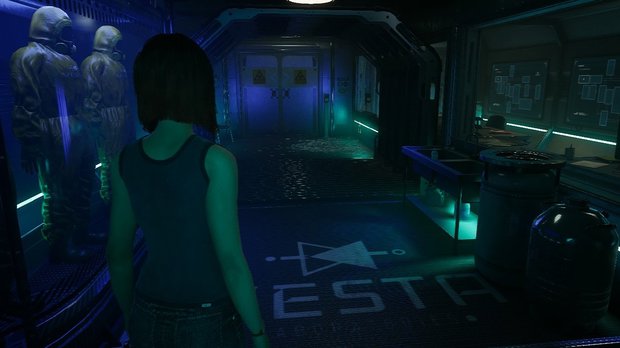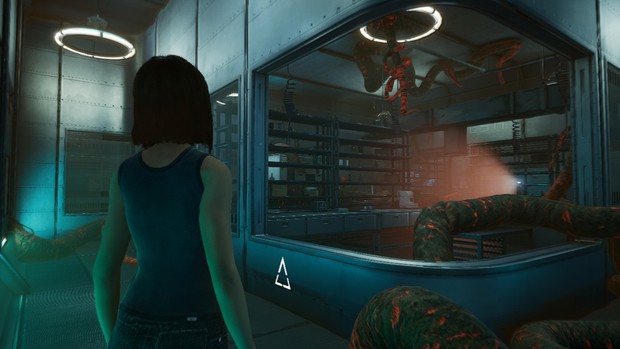Edengate: The Edge of Life review – Lack of engagement a barrier to enjoyment

- 0 Comments
Every adventure gamer has at some point heard the term “walking simulator,” but most games given this descriptor have a deeper purpose than to have you simply ambling around – perhaps a story the developer wanted to tell or a certain vibe they wanted to tap into. I’ve played (and enjoyed) my fair share of such games, so this term isn’t necessarily a denouncement, though for many its use is synonymous with middling, gameplay-lite enjoyment. Unfortunately, HOOK’s Edengate: The Edge of Life embodies some of the most maligned characteristics of this subgenre. The relative lack of anything much to do is let down further by a mediocre narrative that unfolds around you, and the few bits of engagement that are provided suffer from being far too simple. It results in a very one-note experience, at best a two- or three-hour diversion that’s soon forgotten.
You take on the role of Mia, a woman who awakes in a hospital bed without any idea how she got there. It only takes moments to discover that you appear to be alone in the facility: the empty corridors and rooms are devoid of people, while furniture and equipment have been thrown around haphazardly as if some chaotic event has transpired. It’s an intriguing setup that many games would follow up with a player-directed investigation and a satisfying mystery to unfurl, but if you’re assuming you’ll eventually uncover the truth about what has happened here, it’s best to disabuse yourself of that notion immediately.
As it turns out, it’s not just the hospital but seemingly the entire town of Edengate that’s suffered the same strange fate. After venturing outside, you’ll navigate some of the city streets and back alleys, the local high school, and the lab Mia apparently once worked in (the story hints at dangerous experiments – that she had a hand in – being to blame for the town’s current condition). It sounds like there might be some freedom to snoop around and uncover tasty tidbits of a conspiracy theory, but it’s all highly linear and purposely nebulous. Just like the hospital hallways, every path and alley is choked with debris and bric-a-brac, so there’s only ever one single way forward. Occasionally Mia will have to push an item out of the way or create a stepladder to gain higher ground, but even then there are no alternate paths to find or hidden discoveries waiting in dark nooks and crannies.

Given Edengate’s near-post-apocalyptic setting, you might expect some enemies to contend with, some mutated freaks out for blood, or at least the occasional jump scare, but for better or worse, there are none. In fact, at no point is Mia ever in any danger; even when giant alien tentacles begin to show up (this happens pretty early on), they simply exist to block off routes forward and only serve to funnel Mia down the predetermined path. The control scheme utilizes a straightforward third-person over-the-shoulder viewpoint, and movement is smooth and fluid using a gamepad, though it allows for a keyboard/mouse combination as well. The few interactive objects are clearly highlighted at a distance, making it hard to miss one.
The 3D environments look rather good and are nicely detailed, but none of them have much actual purpose. There’s nearly nothing to do en route other than to engage with the odd object that provides the next plot snippet. I found myself somewhat baffled by the lack of interactivity here. Time and effort were obviously poured into the visual aspect of the game, as the areas of Edengate you get to see are carefully designed – painstakingly, even – so for them to be so thoroughly wasted seems a major missed opportunity. Even environmental storytelling is nearly entirely absent here. The one impressive detail is the graffiti art that has sprung up around town over the course of its catastrophe, providing the only insight we ever get as to how the local citizens reacted to the sudden crisis.
Every now and then, Mia will offer a line of (voiced) inner dialogue to shed light on something just so you can put a few basic building blocks together: her experiments at the lab, her relationship with a boyfriend, her adolescent days attending the local high school. Sadly, even that only leads to a somewhat obfuscated ending that fails to wrap things up in a rewarding way.
I’ve made a point of specifying there is “almost nothing to do” and “nearly no interaction” on Mia’s journey. So I would be remiss if I failed to point out the handful of puzzles that offer a small amount of player engagement. Sadly, they’re nothing that go far beyond novice-level brain teasers. Whether it’s a numeric code that unlocks a door, a light that needs to be shone on a mass of tentacles to make them retract, or a generator or film projector waiting to be activated, they’re all simple to solve, with overt instructions or hints always provided nearby. A couple of move-the-object “puzzles” even show the exact places they need to go, making it impossible to flounder in these sections for any length of time. The game wants you to keep moving, and these low-threshold obstacles make it clear that the experience is not meant for those looking for a mental challenge of any but the most basic kind.
Let’s say that everything I’ve mentioned so far isn’t really much of an issue for you – personally speaking, I have absolutely fallen in love with some games where gameplay takes a back seat and story is king. The problem here is that Edengate’s plot isn’t exactly on the heavily fleshed-out end of the spectrum. It is present, with bits and pieces of Mia’s past and what’s happened to the city laid bare as you progress, but it all goes off the rails in the game’s final act. That’s when things take a very surreal twist and whiplashes in a brand new direction that fails to coalesce with anything you’ve seen thus far.
Judging by the post-game dedication that appears as the credits roll, it seems the developer wanted to tell a personal story rather than just a broader sci-fi narrative. I have seen these kinds of intimate stakes instill games with gripping emotion that’s hard to forget. Since Edengate seeks to tell a story very near and dear to the developer’s heart, I wish it had struck more of a chord with me, but I found it rather hard to get on the same wavelength, and the late shift in narrative direction ultimately makes for a muddled, unclear, and unsatisfying conclusion to a mystery that, until then, has teased some sort of payoff at its end.
Final Verdict
There’s nothing about Edengate: The Edge of Life that’s inherently broken or neglected: the voiced dialogue is serviceable, the music fades into its atmospheric background, and navigating the town of Edengate works well enough despite having so little to do. It’s more a case of a game that desperately needed one of its core elements – be it story, puzzles, or creepy mood – to take charge and step into the foreground, putting a definitive stamp onto the overall experience. Instead, everything is accounted for but nothing makes any waves, so the game ultimately just fizzles out and fades away in a forgettable thud rather than a memorable bang.
Hot take
Edengate teases a thrilling tale of a town overrun by otherworldly events, but both its story and gameplay are so threadbare that it ends up falling far short of the mark.
Pros
- Everything works as intended (looks fine, sounds okay, controls well)
Cons
- Puzzles are sparse and laughably easy
- Progression is restricted by forced linearity
- Story is shallow and goes off the rails in the final act











0 Comments
Want to join the discussion? Leave a comment as guest, sign in or register.
Leave a comment